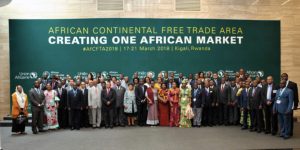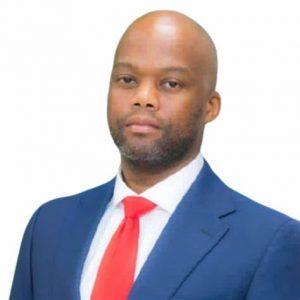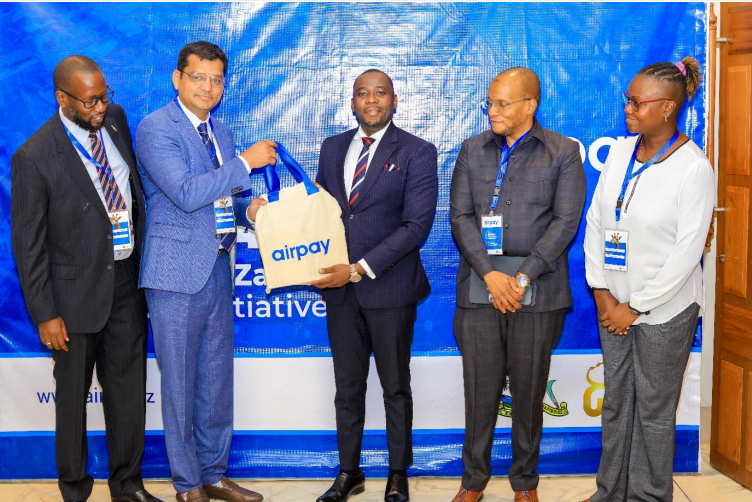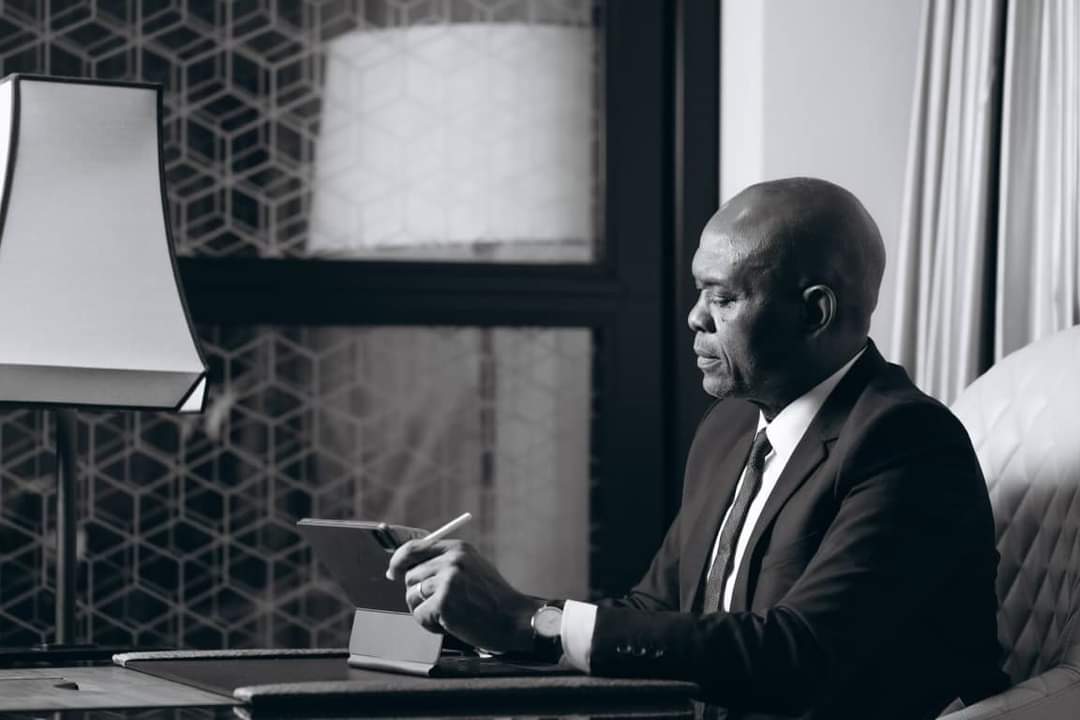Secretary-General, African Continental Free Trade Area, speaks ALM
Building the world’s largest single trade market is undoubtedly an uphill task, but managing the interest of about 54 countries while at it is even more arduous. However, His Excellency Wamkele Mene, the Secretary-General African Continental Free Trade Area, manages both tasks with zest and mastery. The veteran trade diplomat is not new to the task of trade negotiation, having served as South Africa’s Head of Mission to the World Trade Organization in Geneva, Chief Director for Africa Economic Relations in South Africa’s Department of Trade and Industry, and South Africa’s lead negotiator in the African Continental Free Trade Agreement. In this exclusive interview with the African Leadership Magazine, he tells us more about the organization’s efforts towards unlocking the continent’s fortunes through trade. Excerpts:
You are a veteran Trade Diplomat, having served and represented South Africa at the World Trade Organization; among other key roles. Can you share some key milestones in your journey in the trade and economic space?
“Thank you for coming to Ghana for this conversation. I never thought and sought to be Secretary General. So, when I joined the Ministry of Trade of South Africa, probably 17 or 18 years ago, it was an opportunity to serve and contribute. At that time, South Africa was coming out of apartheid, even though it was probably ten years later, but still, the legacy of apartheid was there from an economic perspective. And so, economic policy reform was central to getting the country to have shared opportunities and growth. So that is how I ended up there because I wanted to contribute. I left the private sector and joined the government. Then, of course, when I was a senior trade official and chief negotiator, when I came back from Geneva from the WTO. This became the focus of what I was doing at the ministry. I learned a lot at the WTO when I was negotiating at the WTO. And with the WTO and through the WTO, I learned much about consensus building, particularly concerning very complex economic policy questions. And I also learned a lot about what should be done to get countries to progress. So, the WTO was a learning experience. It was also a learning experience about what not to do in multilateral negotiation. What you should avoid, as you know, is now 23 years since we started negotiating the Doha development round. There has not been any conclusion, and I want to be clear, this is not because of the lack of capacity of the leaders of the WTO, but because of the difference and the differentials in levels of economic development amongst the members of the WTO. But we have achieved significant progress in less than five years, even though we have countries with a GDP per capita of $110 per annum on the opposite extreme, $25,000 per capita. We have middle-income countries in Africa, and we have many countries that are these developed countries. And yet, even with all of these differences, these differentials, we have been able to achieve consensus. So, these are some of the lessons that I learned at the WTO. How to avoid being stuck in a negotiation forever. The second lesson that I learned from the WTO is that if you don’t engage the heads of state, the success that you will achieve will be minimal. And so, we have the highest level of engagement. Our heads of state meet twice a year. They talk about trade and development in Africa. They are the political drivers of the AfCFTA. So, it is critical to have the highest decision makers on the continent to be engaged to drive this. Otherwise, it will not succeed. So, these are the two lessons I’ve learned in the last two and a half years. I came to Ghana on the 15th of August 2020. In the first year, half of the countries, about 42, were in either full or partial lockdown. We could not do anything. The first six months after I was elected, I was in a hotel, and we could not travel or talk to stakeholders. And yet, in a concise space of time, we have achieved what others thought was impossible. A total of 45 countries have ratified the agreement establishing the AfCFTA; we have all of the legal instruments required to make commercially meaningful trade happen. We have a single set of rules of origin. For example, before the AfCFTA, West Africa, East Africa, and Central Africa have different rules of origin. So, if you are an automobile manufacturer and you are in Kenya. If you want to expand your investments to West Africa or Southern Africa, Local content rules are different for the vehicle, which imposes regulatory costs on you as an investor. Now, we have a simple set of rules for over 88% of products traded in Africa. Before the AfCFTA, you may as well have been trading; if you were in Uganda, you might have been trading with somebody in China. Because each region each country had a different set of rules for trade and investment. So, we have harmonized that, and also, for the first time in the continent’s history, we have agreed on rules for resolving trade and investment disputes. legally binding outcomes from the adjudication of disputes by a dispute settlement mechanism. All of these things happened in the last two and a half years. The most important example of ensuring that trade is not just for the negotiators in the room, we have introduced, along with African Banks, the Pan African payments and settlement system, which will enable cheaper, faster, and more affordable trade in 42 currencies in Africa. The cost of currency convertibility is $5 billion annually. If you are in Kenya and want to trade with somebody in Nigeria, you have to convert the Kenyan shilling into the dollar or any other third currency. Then your counterparty receives the dollar. They must convert it into this Nigerian layer that costs about $5 billion annually. That is the cost we know; we don’t know the cost to SMEs or youth entrepreneurship competitiveness, and we cannot quantify those. But we know that because of the cost of currency convertibility, this cost is a barrier to trade. So, we’ve introduced the Pan African payments and settlement system, which will enable that small-medium enterprise in Nairobi to trade in local currency, with a small-medium enterprise in Nigeria to receive local payment when transacting. This is an example of the practical steps to make the AfCFTA a reality. From ambition to action, this is our theme for this year. I was recently in Nairobi when President Ruto and I saw off a shipment of value-added production – Tea produced in Kenya- being exported to West Africa. Under the rules of the AfCFTA, the preferences and preferential treatment are for value-added products. The Tea was produced, and the value was added by smallholder farmers, whom the Government of Kenya organized into cooperatives. They don’t even know that they are contributing to the intra-Africa trade. They may not be aware. But it points out that when you make a concerted effort to have a trade arrangement that addresses inclusivity, you can improve people’s lives through trade. So here you have tons and tons of Tea produced in Kenya, exported by smallholder farmers, and exported to other parts of the continent. This is what the AFC FTA has enabled. Cross-regional trade. Trade in the East African Community is happening. But trade between West Africa and East Africa has not been happening. And trade between Southern Africa and Northern Africa has not been happening. So, these are some of the successes we have recorded since we were established in a concise time. Because with COVID, we could not do anything. Last year in October, we started the guided trade initiative to demonstrate that the AfCFTA is functional. Close to 100 products were traded amongst about seven countries. I mentioned the Tea from Kenya. Ghana exported ceramic tiles from Ghana to Cameroon. The importer in Cameroon received a duty reduction of 20%. That means the company is more competitive than before the AfCFTA. So, the ceramic tiles in Cameroon can now compete with other made in other parts of the world that I will not mention, which we all know are cheaper and more competitive. So, these are some successes; of course, there are challenges. And the challenges will always be there. But I believe the continent is far better off today than five years ago before the AfCFTA.
In your speech on the 1st of January 2021, signaling the official commencement of the trade under preferences of the African Continental Free Trade Area, you said, “Today is a day we take Africa a step closer to a vision of an integrated continent, a vision of an integrated market on the African continent.” Two years on, what is your take on the journey thus far?
“It is now time to move beyond words into action. We recently discussed the formation of the Organization of African Unity in May 1963 and how the founding mothers and fathers of the OAU had this grand vision of an integrated Africa. Of course, the starting point was to push back colonialists. And with South Africa defeating apartheid, that objective was achieved. But when you look at the founding documents of the OAU, what has evaded us as a continent is the integration of our economy. We have only 18% of Intra African trade, which we can point to because, in the past 60-70 years, we have been far more focused on trade between Africa and Europe. So we must transition to action to dismantle this colonial economic model that we inherited and sustained. We can only do that by breaking and dismantling that model of the colonial economic model, and we can only dismantle it by focusing on building trade patterns amongst African countries. If you go to most countries on the continent, the most accessible connectivity is between Johannesburg and London, Luanda and Lisbon, West African countries and Paris. The connectivity among African countries could be better, and that is because of this trade pattern.
Similarly, in most African countries, you have the rail infrastructure that takes minerals from the mines to the ports to take the minerals out. And that is a result of this colonial economic model. So we have to be courageous to break that model. Without, of course, disengaging and disconnecting from the global economy because we cannot, it’s not possible. But we have to be courageous to break that model of colonial Africa. And to break it completely. And to establish trade patterns that will enhance productivity in Africa, create jobs that will spur innovation, and ensure that young people stay here instead of going to other parts of the world to look for jobs. So, we have a long way ahead of us. But we’ve got to start somewhere. We’ve got to start somewhere. So, it’s a monumental task that we’ve set ourselves. But as I say, we’ve taken the first steps.”
A world bank report projects that if well implemented, the AfCTA by 2035 will lift one hundred million Africans out of poverty. Is the implementation of the Act on track to achieve this laudable feat?
“It is a very encouraging projection by the World Bank. They also say in that study that we have an opportunity to contribute by the year 2035 $450 billion to Africa’s GDP by boosting intra-African trade and improving intra-Africa trade by over 80%. So we need help to do it as a secretariat. We will require the state parties to the AfCFTA agreement and the state parties to implement the deal. It’s achievable. It’s possible. In the last two and a half years, we’ve demonstrated that it’s possible. But we will have to intensify the implementation over the next 15 years. That means that the largest economies in Africa must be willing to open up their markets proportional to their size. So, Morocco, South Africa, Nigeria, and Kenya, are countries that will have to do more, and thankfully, there is a realization that the bigger the economy, the more you have to do. President Ramahosa told me his ambition is to ensure other Africans understand that the South African market is open for trade and investment through the AfCFTA.
Similarly, other heads of state say President Ruto is very supportive and says that Kenya will do what it can to ensure the agreement is implemented. But you know, smaller economies are willing to pull their weight. So it’s achievable. The projection is particularly encouraging because they conclude by saying the most immediate beneficiaries of what you cited. The data I quoted from that study will be small and medium enterprises that women and young people lead. We must double our efforts to realize this because over 450 million Africans are employed in small and medium enterprises. This is a significant part of Africa’s economy. So we have to double our efforts to ensure we reach these targets. We will have challenges, and we will have a man who will wake up in a military barracks and decide that he wants to be President without being elected by African people, disrupting trade, closing borders and visiting havoc on economic activity along the borders. But thankfully, the African Union and the ECOWAS have been very clear in condemning coup d’etat that disrupts growth in different African countries. We will have such disruptions and balance of payments challenges for certain countries; we will have disruptions caused by climate change, and all of these things will happen. But we must stay the course and remain determined because we have lost almost 70 years. So, we cannot afford to lose more time to ensure we see the reality of an integrated continent. So I am confident that we will reach that target if we remain on track”.
One of the significant hallmarks of your role as the Secretary-General is that you have to report to “54 Boss'” who are also heads of state in their countries. How do you manage this process to ensure a smooth flow of activities and timely delivery of tasks?
“I have the support of all of the heads of state. That makes a big difference. Then, there is President Mahamadou Issoufou, the former President of Niger, who is the champion of the AfCFTA. We have here President Nana Akufo Addo, who is highly supportive, the outgoing chairperson of the assembly of heads of state and government. President Macky Sall is also very supportive. So, the level of support amongst heads of state is extremely high. And that makes the job easier. Of course, I have to travel extensively to meet with them and report progress to them. That’s part of the job. But really and honestly, the political will is unprecedented. And the commitment also to ensuring we reach the targets we were discussing. The commitment is unparalleled. Of course, they sometimes have differing opinions about what should be done. But I’m happy that the heads of state have resolved all of the policy disagreements that we have had, even at the level of ministers. So, it isn’t easy, of course, but the task is made easier by the strong political will that exists”.
In your acceptance speech in March 2020, during your inauguration as the first Secretary-General of the AfCTA, you promised to take concrete steps towards ensuring that women and young Africans are at the heart of implementing the AfCFTA. Can you share some of the measures put in place to achieve this stated objective?
“When I was at the WTO, many, many times, I was the youngest person in the room. And the negotiations were very, very abstract and did not relate to youth intrapreneurs and their desires for export markets to develop their businesses. Similarly, I was concerned when I was at the WTO for small and medium enterprises that women lead. I consistently heard concerns about large corporations benefiting from free trade. Now, our continent, as I mentioned earlier, has the most significant number of youth in the world. By the turn of the century, one in four people will be in Africa, and the youngest population of adults will be on our continent. As I said, the drivers of Africa’s economy are small and medium enterprises contributing close to 60% of Africa’s GDP. That should tell us something, it should say to us that this opening of markets must not benefit only the large corporations, which it must, but they must not be the only beneficiaries if it is to have credibility. So, the first step we took, I went to various heads of state, and I said, I think that we need to have we need to transition beyond just aspirations about women economic empowerment, youth economic empowerment, that these aspirations, we must codify them into legally binding commitments. And they agreed; I did not have to convince or persuade them. So, we are now negotiating a protocol for women and youth in trade. You can look at any international trade agreement for the first time in history. There is not a single trade agreement that has a protocol on women and you in trade to address the specific challenges and the specific barriers that women confront that young people encounter when they want to export their goods to other countries within the region or the continent. So, we will conclude negotiations of this protocol by June, and then we will start implementing it. Last year in September, under the patronage of Her Excellency Mama Samia Suluhu Hassan, we hosted the first of its kind Women and Youth in Trade Conference in Dar er Salaam. It was the first time there was a focused discussion on young people.
We discussed how young people, small and medium enterprises, can benefit from trade across the African continent. It is, of course, far from what we should do. But again, it is a step that we must take to confront some of the imbalances we see in trade. If you remember, a few years ago, five or six years ago, a prominent gentleman argued that trade agreements benefit only the elite, that trade agreements benefit large corporations, and that they export jobs from the US to Mexico. Now, that analysis has electron appeal because he ended up in the White House as the President of the United States. So, you can see that if globalization and trade agreements as a subset of globalization, if, if trade agreements don’t deliver for small and medium enterprises for young people, the credibility, the intellectual credibility of free trade, will be forever lost, at least in the case of Africa. So’ if you believe in free work, as I do, you have to take concrete steps to ensure that free trade delivers for development, not just for large corporations, but for growth. So that’s what we are doing in this protocol on women and youth in trade; we will need the private sector in Africa to come on board, we will need the governments to come on board, the youth formations to come on board to work with us in the implementation of this protocol”.




